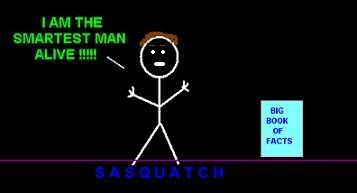
Originally Posted by
Heartless Angel

However, ultimately there is no real reason to believe anything at all. The only purpose it serves is give an individual a sense of understanding of the world and one's place in it. For some this is science, for others religion and spirituality. If you're into pragmatics, there's the ultimate reason for you. Without our beliefs, whatever they may be, none of us would be able to function.
Actually, it's among the most difficult of all arguments to make. You yourself take the first step into it, but you don't continue. Somebody poses an opinion to you you disagree with, your first question is, "why?". This is appropriate, and is the correct first step. However from there, you simply accept or reject the argument. To reach the conclusion that all is illogical, one must repeat the process and look at the premises for the argument given and ask, "Why?". Another argument will be presented for these premises, still can't pass judgement, we need to understand more about why we think what we think. You keep asking why long enough, and keep breaking down each and every belief, and figuring out what other beliefs they need to stand on, eventually you reach the fundamental levels of a person's beliefs. This is when we hit the particularly nasty questions such as, "Well then, what is existence?", "How did the universe begin?". No data from within the entity we know as the material universe can ever explain concepts that lie outside of it. We run out of empirical data to base these fundamental beliefs on, because all empirical data is contingent on their answers. Even if we found a logical conlusion for them, I can turn around and whip out the "Logically, what makes your understanding of logic correct?", which is literally logically unanswerable. There are things which we can't ever know, we can only believe, because without these beliefs al of our other beliefs and the things we accept as truth fall apart around us, and we become lost. To seek truth, and find that the only truth is, we can't grasp the truth, is among the most diffifult conclusions to accept as a critical thinker.
This is perfectly illogical. As the very definition of logical proof demands that premises make the conclusion nescessarily true. You only have proof if you can establish absolute certainty. If you can't establish proof through deduction, the other options is establishing evidence through induction. Induction can NOT prove a conclusion, it can suggest and support it, but never establish certainty. Without that certainty, to accept the conclusionas true (which is an absolute) anyways relies on faith. If you do not have absolute certainty, you must have faith, or you have nothing more than believing it because it suits you.








 Reply With Quote
Reply With Quote




















Bookmarks